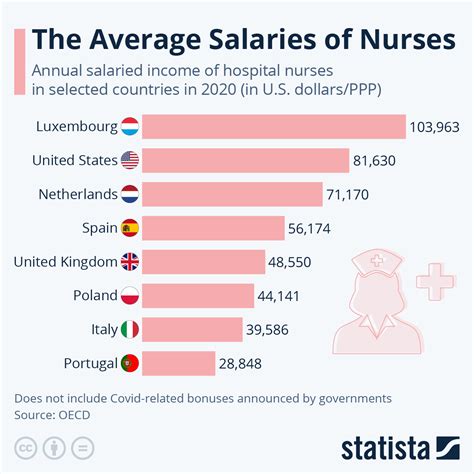Earning a Doctor of Nursing Practice (DNP) represents a pinnacle of clinical nursing education, preparing you for the highest levels of leadership and patient care. This terminal degree is not just an academic achievement; it is a significant career investment that unlocks access to highly specialized roles, greater autonomy, and substantial earning potential. While salaries can vary widely based on your chosen path, it’s common for DNP-prepared professionals to earn well into the six figures, with many roles offering salaries between $125,000 and over $200,000 annually.
This guide will break down the salary you can expect with a DNP, the key factors that influence your income, and the outstanding job outlook for this advanced profession.
What Does a Doctor of Nursing Practice Do?

It's essential to understand that a Doctor of Nursing Practice (DNP) is a degree, not a specific job title. It is a terminal practice doctorate that builds upon a master's degree, focusing on evidence-based practice, quality improvement, and systems leadership.
A professional with a DNP can pursue one of two primary career tracks:
1. Advanced Practice Registered Nurse (APRN): This is the most common path, involving direct patient care in a specialized role. DNP-prepared APRNs include Nurse Practitioners (NPs), Certified Registered Nurse Anesthetists (CRNAs), Certified Nurse-Midwives (CNMs), and Clinical Nurse Specialists (CNSs). They diagnose illnesses, prescribe medications, and manage patient care.
2. Aggregate/Systems/Organizational Leadership: This track focuses on high-level, non-clinical roles. These professionals use their expertise to improve healthcare outcomes on a broader scale. Titles include Nurse Executive, Chief Nursing Officer (CNO), Director of Clinical Operations, Public Health Manager, or Nursing Informatics Specialist.
Your specific role is the single biggest determinant of your salary.
Average Doctor of Nursing Practice Salary

Because DNP graduates work in diverse roles, salary data is best understood by looking at the specific positions they hold. A general average for a professional with a DNP degree often falls around $115,000 per year, according to salary aggregator Payscale. However, this figure blends lower-paying academic roles with high-earning clinical specialties.
For a more accurate picture, it's best to examine the median salaries for common DNP-held positions, using data from the U.S. Bureau of Labor Statistics (BLS) as of May 2023.
- Certified Registered Nurse Anesthetists (CRNAs): $212,650 per year
- Nurse Practitioners (NPs): $128,490 per year
- Medical and Health Services Managers (e.g., Nurse Administrators/Executives): $110,680 per year
- Postsecondary Nursing Instructors and Teachers: $80,780 per year
*(Source: U.S. Bureau of Labor Statistics, Occupational Outlook Handbook, May 2023 Data)*
As the data shows, a DNP can lead to a wide range of incomes, with clinical specializations like nurse anesthesia commanding the highest salaries.
Key Factors That Influence Salary

Beyond your specific job title, several other factors play a crucial role in determining your final compensation package.
###
Level of Education (DNP vs. MSN)
While both a Master of Science in Nursing (MSN) and a DNP can lead to APRN certification, the DNP is a terminal degree that signals a higher level of expertise. This can translate into higher pay. Many organizations offer a "doctoral differential" or prefer DNP-prepared candidates for senior clinical, faculty, or executive leadership positions. A DNP equips you with skills in systems thinking, evidence-based practice implementation, and quality improvement, making you a more valuable candidate for roles that blend clinical practice with administrative oversight, which often come with higher compensation.
###
Years of Experience
Experience is a powerful driver of salary growth in nursing. An entry-level DNP graduate will earn less than a seasoned professional with a decade of practice. Salary.com data illustrates this progression clearly for a Nurse Practitioner:
- Entry-Level (0-2 Years): Approximately $119,300
- Mid-Career (6-8 Years): Approximately $129,500
- Senior-Level (15+ Years): Approximately $143,100
This demonstrates a clear and rewarding financial trajectory as you build your skills and reputation in the field.
###
Geographic Location
Where you choose to work has a massive impact on your salary. Metropolitan areas and states with a high cost of living and high demand for healthcare providers typically offer the highest wages. According to the BLS, the top-paying states for Nurse Practitioners are:
1. California: $164,050 (annual mean wage)
2. New Jersey: $147,750
3. Massachusetts: $145,910
4. Oregon: $145,210
5. Nevada: $141,360
It's important to balance these high salaries against the local cost of living. A slightly lower salary in a state with more affordable housing and taxes may offer greater financial freedom.
###
Company Type / Work Setting
The type of facility you work in directly affects your compensation. DNP-prepared professionals can find opportunities in a variety of settings:
- Hospitals (Outpatient/Inpatient): Often the highest-paying employers, especially for specialty roles like CRNAs and acute care NPs.
- Private Physician Offices: Offer competitive salaries and may provide more autonomy and a regular work schedule.
- Specialty Clinics: Clinics focusing on dermatology, cardiology, or mental health can offer high earning potential due to the specialized nature of the care.
- Academia: University and college positions for DNP-prepared faculty typically pay less than clinical roles but offer benefits like research opportunities, teaching, and better work-life balance.
- Government: Roles within the Department of Veterans Affairs (VA) or other government health systems offer strong job security and excellent benefits.
###
Area of Specialization
Within the APRN and leadership tracks, your specialization is a critical salary factor.
- Nurse Anesthetist (CRNA): This is consistently the highest-paid nursing specialty due to the high-stakes nature of the work and extensive training required.
- Psychiatric-Mental Health Nurse Practitioner (PMHNP): With a nationwide shortage of mental health providers, PMHNPs are in extremely high demand and often command salaries higher than many other NP specialties.
- Family Nurse Practitioner (FNP): As one of the most versatile and common NP roles, FNP salaries are strong and reflect the broad demand for primary care providers.
- Nurse Executive: A DNP-prepared Chief Nursing Officer or healthcare administrator in a large hospital system can earn well over $200,000, with compensation tied to the size and budget of the organization.
Job Outlook

The career outlook for DNP-prepared nurses is nothing short of exceptional. The healthcare industry is facing a growing demand for highly skilled providers, driven by an aging population, an increased focus on preventive care, and a need for greater efficiency in healthcare delivery.
The BLS projects that employment for Nurse Anesthetists, Nurse Midwives, and Nurse Practitioners will grow by 38% from 2022 to 2032. This is phenomenally faster than the average for all occupations. This growth is expected to result in about 30,400 new jobs over the decade. This high demand ensures robust job security and strong negotiating power for DNP graduates for years to come.
*(Source: U.S. Bureau of Labor Statistics, Occupational Outlook Handbook, APRNs)*
Conclusion

Pursuing a Doctor of Nursing Practice is a strategic move for any ambitious nursing professional. It is an investment that pays dividends not only in financial terms but also in professional autonomy, leadership opportunities, and the ability to shape the future of healthcare.
The key takeaways are clear:
- High Earning Potential: A DNP unlocks access to roles with six-figure salaries, with top specializations like nurse anesthesia exceeding $200,000 annually.
- Your Role Defines Your Salary: Your income is primarily determined by your job title (e.g., CRNA, NP, Nurse Executive), not just the degree itself.
- You Have Control: Factors like your specialization, work setting, geographic location, and years of experience give you significant power to influence your career earnings.
- An Outstanding Future: With a projected job growth of 38%, the demand for DNP-prepared professionals is exceptionally strong, promising a stable and rewarding career path.
For those looking to reach the highest echelon of the nursing profession, the Doctor of Nursing Practice offers a clear and lucrative pathway to achieving your professional and financial goals.
